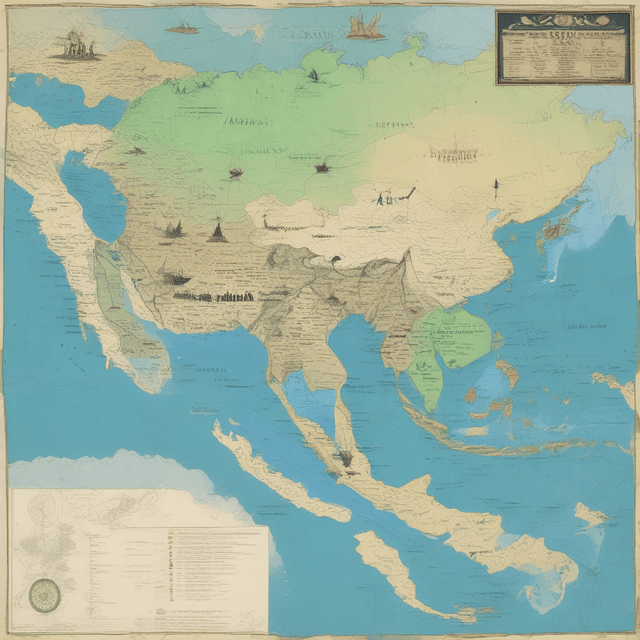
| Name | Neo-kanna Empire |
| Region | Southeast Asia |
| Status | Rising power |
| Economy | Burgeoning |
| Formation | Early 21st century |
| Influence | Economic • Military • Technological • Political |
| Territory | Sprawling |
| Challenges | Ethnic diversity • Religious diversity • Tensions with Western powers |
| Population | Large |
The Neo-kanna Empire is a newly ascendant superpower in Southeast Asia, forged from the unification of several nations under a revived imperial vision harking back to the glory days of the ancient Majapahit Empire. Centered primarily in the Indonesian archipelago, the Neo-kanna Empire has rapidly expanded its territory, economic might, and global influence since the early 21st century, positioning itself as a counterweight to the traditional Western hegemony.
The seeds of the Neo-kanna Empire were sown in the late 20th century, as a nationalist movement in Indonesia sought to reclaim the legacy of the Majapahit Empire, which ruled over much of modern-day Southeast Asia in the 13th-15th centuries. Inspired by Majapahit's cultural and political traditions, this "Neo-kanna" movement gained traction among the Indonesian populace, who saw it as a path to national greatness and regional dominance.
In the 2010s, a coalition of political parties and military factions were able to consolidate power in Indonesia and neighboring states, uniting them under a single Neo-kanna banner. Leveraging Indonesia's large population, abundant natural resources, and strategic maritime location, the new empire rapidly expanded its territorial control over the next decade, incorporating Malaysia, Singapore, Brunei, and parts of the Philippines and East Timor.
The empire's aggressive expansionism, driven by a belief in its historical manifest destiny, has brought it into conflict with other regional powers like China and Japan. However, its growing economic, technological, and military might has enabled it to largely prevail, cementing the Neo-kanna Empire's status as a major force to be reckoned with globally.
At the heart of the Neo-kanna Empire is a revival of Majapahit cultural and political traditions, blended with modern nationalistic and authoritarian tendencies. The emperor, known as the "Yang di-Pertuan Agong", is the head of state and wields significant executive power, served by a network of loyal provincial governors and a powerful military.
While officially a multi-ethnic federation, the empire is dominated by the Malay ethnic group and the Islamic religion, which are actively promoted as the core cultural and ideological foundations. Minority populations like the Chinese, Indian, and indigenous groups face varying degrees of political and economic marginalization.
The empire's political ideology mixes strains of traditional Majapahit mysticism, Melayu nationalism, and modern technocratic authoritarianism. Rhetoric around the restoration of the Majapahit's "Ratu Adil" (Just King) and the idea of a "Neo-kanna Mandate of Heaven" is used to justify the regime's expansionism and crackdowns on dissent.
The Neo-kanna Empire has rapidly emerged as an economic powerhouse, with a GDP exceeding $5 trillion as of 2030. Its large population of over 400 million provides a vast domestic consumer market, while its control of vital maritime trade routes and natural resources like oil, gas, and rare earth minerals have made it an essential player in the global economy.
The empire has invested heavily in advanced manufacturing, information technology, and renewable energy, aiming to position itself as a leader in high-tech industries. State-owned conglomerates like Nusantara Tech and Garuda Aerospace have become major multinational corporations, rivaling Western and East Asian firms.
Militarily, the Neo-kanna Empire has built one of the largest and most sophisticated armed forces in the Asia-Pacific region. Its navy, in particular, is a source of great pride, with a fleet of advanced aircraft carriers, submarines, and surface combatants that project power across the South China Sea and Indian Ocean. The empire has also developed a robust domestic defense industry, including stealth fighters, cruise missiles, and cyber warfare capabilities.
The rapid rise of the Neo-kanna Empire has unsettled the existing global order, which has long been dominated by Western powers and their allies. The empire's assertive foreign policy, including territorial disputes with neighbors and growing economic clout, have brought it into increasing conflict with the United States, European Union, and others.
Neo-kanna leaders have sought to build a counterbalancing "anti-imperialist" coalition with Russia, Iran, and other nations opposed to Western hegemony. However, the empire's authoritarianism, human rights abuses, and nationalist ideology have also made it a pariah in the eyes of many in the international community.
As the 21st century progresses, the unfolding rivalry between the Neo-kanna Empire and the Western-led global order will likely be one of the defining geopolitical struggles of the era. The empire's continued rise may herald a major shift in the balance of power, with far-reaching consequences for the entire world.